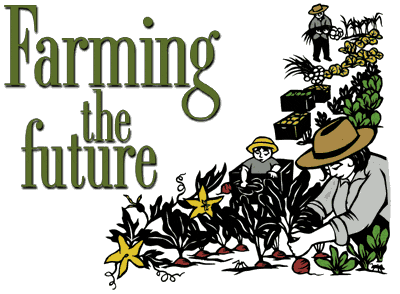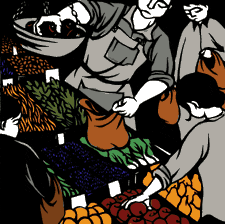Farming the future
by Bonnie Rice, Washington Sustainable Food & Farming Network
This article was originally published in August 2002

Picture a food and farming system that honors and builds strong relationships between farmers, farm workers, and communities. Where food is celebrated as an important and valued part of our culture …
See below:
Where there is a strong emphasis on local production and consumption, and a wide variety of crops are grown by many family-scale farms. Where farming practices are based on principles that respect and enhance the environment, conserve water, build the soil, and protect biodiversity. Where farm workers receive a living wage and where farmers receive a fair price. Where there is an abundance of local processors and marketing opportunities. Where a supportive infrastructure exists that encourages multi-generational farming. A system where all people have access to fresh, nutritious food.
Impossible? No. This vision of agriculture — a food and farming system that is economically, socially and ecologically sustainable — is slowly but surely becoming a reality right here, right now, through the actions of dozens of organizations and thousands of people across the state of Washington. The face of Washington agriculture is changing — for the better.
Sustainable and organic food production and consumption are growing by leaps and bounds in Washington. More than 40,000 acres were certified organic or in transition to organic in 2001, compared to approximately 6,000 acres in 1993.
The number of organic farms has more than doubled since 1995, to more than 500 today. (These numbers reflect only farms that are certified by the Washington State Department of Agriculture [WSDA]; they do not include exempt growers with sales less than $5,000 per year or farms using organic practices that choose not to certify their farm.)
Sales of organic products now top $140 million annually. Farmers’ market sales have grown rapidly, to more than $15 million in 2001, fueled by the increasing public desire to know how, where, and by whom our food is produced. ‘Conventional’ farmers are increasingly adopting practices that are more environmentally sustainable, such as using compost teas instead of synthetic fertilizers and reducing their use of pesticides.
Many individuals, organizations and businesses are working to bring about this change. The Washington Sustainable Food & Farming Network brings together many of them to advocate with one voice for sustainable agriculture at the state level. Created in 1997, the Network has become a leading voice for sustainable agriculture and a key catalyst for change in food and farming policies and practices in Washington State.
Our members include farmers, environmental organizations, faith-based groups, retailers, processors and distributors in the natural foods industry, farmers’ markets, anti-hunger and nutrition advocates, and individual consumers. Before the Network’s creation, no such framework existed. Our focus on state policy and programs, and the breadth of our constituency make us a unique organization in Washington, and indeed throughout the western United States.
The Network is viewed as a regional and national model for the change that a broad-based, statewide alliance for sustainable agriculture can achieve, particularly with our state agricultural institutions, Washington State University (WSU) and the Washington State Department of Agriculture (WSDA). These institutions play a large role in setting the direction of Washington agriculture.

Historically, sustainable and organic agriculture and small farms have not had a voice with these institutions, but that changed dramatically with the Network’s formation. Network advocacy efforts, combined with the growing public demand for sustainable food and a handful of committed visionaries working inside these institutions, have caused a significant change in how these institutions view sustainable agriculture. The sustainable agriculture community has gained its rightful ‘place at the table’ and some fundamental change is in the works.
- In 2000, WSU created its first-ever Small Farms Program to address the research needs of small farmers in Washington;
- Within the past year, WSU’s Center for Sustaining Agriculture and Natural Resources has developed a comprehensive proposal for an Organic and Biologically Intensive Agriculture Program and is moving forward on an Organic Farming major — which would make WSU the first land-grant university in the country to have an organic degree program;
- In 2001, WSDA created its first direct marketing program and $650,000 in state and federal funds were earmarked for the program by the state legislature and WSDA;
- In the face of state budget shortfalls, the Network and other groups succeeded in preserving funding for the Women, Infants and Children (WIC) Farmers Market Nutrition Program and persuaded the Department of Health to allow low-income families to purchase organic food in grocery stores with WIC vouchers.
What has made these advancements possible over such a relatively short time are the many individuals, organizations and businesses combining their skills, expertise and passion together under the Network’s umbrella. These successes would not have been possible by any one group alone.
Sustainable agriculture has made excellent progress, but it will take hard work in the coming years to ensure that agriculture takes the right path in Washington. Further commercial release of genetically-engineered crops, including genetically-engineered wheat in Washington, and the rapid corporate consolidation of agriculture (in which the biotechnology industry plays a large role) present profound threats to achieving a sustainable food and farming system.
These forces have a very different vision for agriculture, one that concentrates control of the food supply into the hands of a few multi-national corporations and holds unknown, potentially devastating consequences for the environment.
The biotechnology industry is pouring tens of millions of dollars annually into public relations campaigns and is working hard to increase its influence over our public agricultural institutions. Indeed, while WSU’s College of Agriculture is moving the Organic and Biologically Intensive Agriculture program forward, it also is preparing a multi-million dollar biotechnology funding request to take to the state legislature in 2003, and it is hosting the 2003 meeting of the National Agriculture Biotechnology Council, which strongly influences public university research priorities.
The presence of the Network is crucial, both as a watchdog and as a strong, unified voice for sustainable agriculture as the best future direction for agriculture in Washington state.
There is incredible strength in numbers and diversity. We invite you to join us and be part of this effort. Working together, we can create a strong, healthy, sustainable food and farming system in Washington state.

Join the Network — your voice is needed! If you join by the end of the year, your membership contribution will be matched dollar for dollar by the Bullitt Foundation, which awarded the Network a challenge grant in 2002 to raise $10,000 in new member contributions. Please help us meet the Bullitt challenge! Contact us at 360-527-9426 or info@wsffn.org.
We in the Pacific Northwest are fortunate to have so many people in our midst committed to making our agricultural system more sustainable. Among the many examples:
- Washington Tilth Producers works to educate farmers and others about organic and sustainable production and marketing practices;
- PCC and many other co-ops around the state bring organic, sustainable, locally produced food to the public and play a key role in educating the public about the importance of sustainable agriculture;
- Cascade Harvest Coalition and many counties around the state coordinate annual harvest celebrations of local agriculture;
- Puget Sound Fresh, Whatcom Fresh, Skagit’s Own and other ‘buy local’ campaigns encourage public support of local agriculture;
- PCC Farmland Fund, Washington Farm Link and Skagitonians to Preserve Farmland work to preserve farmland and ‘keep farmers farming;’
- Seattle Tilth, the P-Patch Program, Tahoma Food System, and Pike Place Market increase local food security through urban gardening and community supported agriculture programs;
- Washington State Farmers Market Association, the Neighborhood Farmers Market Association, and individual markets work to build connections between the public and farmers, and to increase sales for local farmers;
- Spokane Tilth, the Northeast Farmers Market Association, Rural Roots, the Lopez Community Land Trust, Partnership for a Sustainable Methow and many community-based organizations work to build the infrastructure for local food systems that will help small farms get their products directly to the public;
- Children’s Alliance, Earth Ministry and the Lutheran Public Policy Office work to increase low-income families’ access to local and organic foods;
- United Farm Workers and the Washington Association of Churches work to increase the economic sustainability of farm workers and growers through the Washington Fair Trade Apple campaign and other efforts;
- Washington Toxics Coalition, People for Environmental Action and Children’s Health, 1000 Friends of Washington, Washington Environmental Council and other environmental organizations work to reduce use of pesticides and encourage conservation practices;
- Farming and the Environment works to increase incentives for good stewardship practices by farmers;
- The Food Alliance works to increase consumer support of farms using sustainable practices through its eco-label;
- WSU is increasing support for small farms, organic and sustainable agriculture through the Small Farms Program and the Organic and Biologically Intensive Agriculture Program;
- WSDA is increasing support for small farms and local food systems through the Small Farm & Direct Marketing Program and the Heart of Washington program;
- And of course, the hundreds of sustainable and organic farmers and processors and the hundreds of thousands of people who support them by buying their products.
